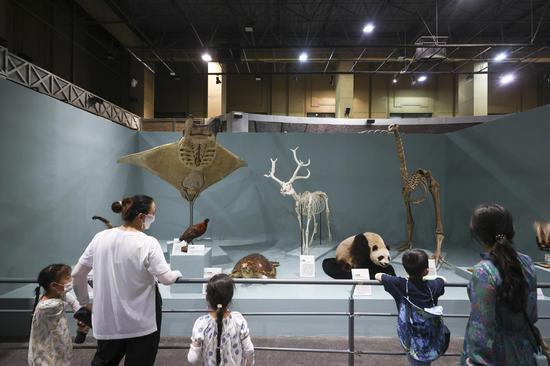A team of researchers at China's Northwest University has made a groundbreaking discovery in the evolution of social behavior in primates.
According to a publication in the journal Science on June 2, there is a direct link between a genomically regulated adaptation and the social evolution of primates.
The article is titled "Adaptations to a cold climate promoted social evolution in Asian colobine primates".
It found that colobine primates that inhabit colder environments tend to live in larger, more complex groups. Glacial periods over the past 6 million years promoted the selection of a set of genes responsible for the metabolism and neurohormonal regulation in cold conditions.
The team obtained the first chromosome-level nonhuman primate genome and developed the phylogenetic relationship to understand the evolutionary process of social systems in Asian colobines, according to a release from the university.
Genes govern the production of hormones, and of hormone receptors and other components essential for their synthesis, transport and removal.
The article showed that more-efficient dopamine and oxytocin pathways developed in odd-nosed monkeys, which may have resulted in extended maternal care and lactation, increasing infant survival in cold environments.
Oxytocin is a hormone that aids childbirth and is commonly referred to as the "love hormone".
Dopamine is a brain chemical that boosts motivation, attention, pleasure and movement. It can create a sense of reward or pleasure when released.
Qi Xiaoguang, a professor of life sciences at the university and one of the primary authors of the paper, said that in harsh environments such as colder climates, parent monkeys invested more in child-rearing, leading to stronger bonds. This environment drove the evolution of neurotransmitter systems in primates, leading to more cooperative behavior and ultimately, the formation of larger, more complex social groups.
These adaptive changes appear to have strengthened interindividual affiliation, increased male-male tolerance and facilitated the stepwise aggregation from independent one-male, multifemale groups to large multilevel societies, the article said.
Typical multilevel societies, usually consisting of several hundred individuals, are composed of several core one-male-multifemale units, as well as some all-male bachelor groups, Qi said.
The family units shared resources and formed alliances. They showed a strong sense of attachment to each other and were less tolerant of bachelors, he added.
"Snub-nosed monkeys in the Qinling Mountains live in cold climates and lack food, so they prefer huddling to keep warm and groom each other's hair. This increases friendly behavior and tolerance between individuals," Qi said.
"I hope that someday, humans will benefit from increasing dopamine and oxytocin levels to promote greater tolerance and cooperation," he said.
This research not only sheds light on the evolution of primate social systems, but also offers the new paradigm of genome study as a way for animal researchers to better understand animal behavior, the release said.
The team collaborated on the study with universities, research institutes and zoos at home and abroad and analyzed 2,903 Asian colobine habitats, creating the most comprehensive Asian ecological data set.
The study of Asian colobines' social evolution is part of the larger Primate Genome Project, a research effort involving over 100 scientists from countries including China, the United States, Germany and the United Kingdom. The project announced its latest advance in primate genomics, releasing genomic data of 27 primate species on June 2 in the journal Science, Xinhua News Agency reported.
Initiated by the Kunming Institute of Zoology under the Chinese Academy of Sciences in 2018, the project involves researchers from more than 50 institutes and colleges across the globe.
It aims to complete the genetic sequencing of the 520 known primates on Earth in three phases within a decade to create a primate genome map to better decipher the genetic information of these close human relatives, Xinhua reported.


















































 京公网安备 11010202009201号
京公网安备 11010202009201号